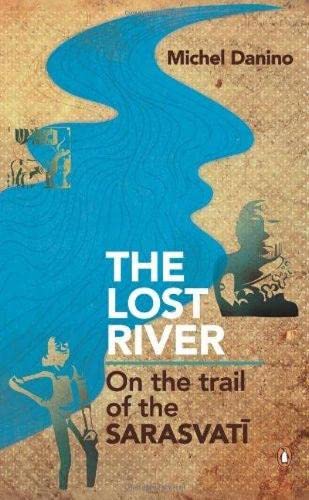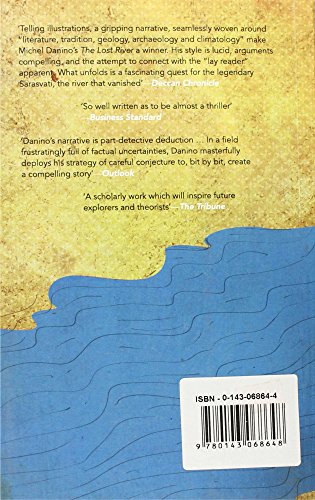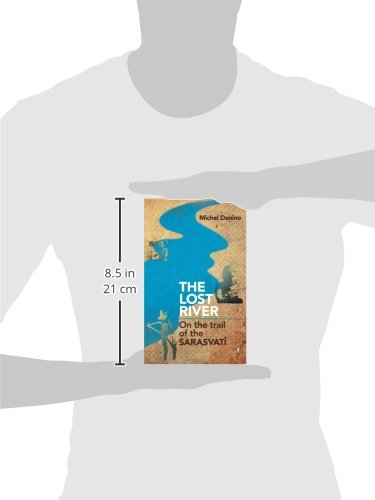Customer Services
Copyright © 2025 Desertcart Holdings Limited




Full description not available
P**R
A Thriller!
Readers and critics often talk about historical thrillers. Sometimes they invent sub-genres like archaeological thrillers or mythological thrillers, while trying to pigeonhole some unputdownable action-driven story dotted with physical or metaphorical blasts from the past.But here comes something which is history, as a crime thriller! Let me describe the situation in such terms.The Estate:There used to be a massive river, fed by perennial sources, bringing life and sustaining civilisation over a very large area. One day geographical whims and other factors started killing it. Slowly it withered and eventually died, forcing its children to move away, but not without its loving memory. They mixed with others, resettled and gave their memories a written shape, while developing new features in their culture due to changing geography. Eventually, known history came to consider them as the starting point of history.The Inheritance:Archaeological, seismic and hydrological studies submitted irrefutable proofs to show that the successors now inhabiting over a vast region had originated from the area and the people nourished by that once mighty river, and NOT from some imaginary people who were otherwise being equated with rulers and heroes.The Crime:Some people panicked. They were apparently well respected, but had come to define their positions more through rhetoric and ideology than evidence. An intricate web of lies and deceit had been spun in the meanwhile, to ensure divide and rule, by declaring North Indians as invading Aryans and South Indians and tribal people as the 'original residents'. Now that web started getting unraveled due to hard facts brought out by satellite-imagery and excavations. So those esteemed Marxist historians, notably Romila Thapar, Irfan Habib and R.S. Sharma swung into action. They received support from other people with vested interests. As a result, versions of history which have got discredited more than sixty years ago continued being taught in schools forcing billion plus people to forget their past and their own heritage.The Fightback?For that you have to read this book. This incredibly meticulous and well-argued work clearly establishes:1) There was a Saraswati river, fed by numerous streams and also feeding lakes, other rivers and above all, the people who had once set up one of the greatest civilisations in the history of mankind.2) Those who had composed the Rig Veda and post-Vedic literature were intricately aware of its existence and the role that it had played once.3) The civilisation still being described as the 'Indus Valley Civilisation' is actually an Indus-Saraswati civilisation at least, if not the Saraswati Civilisation.4) As a result of the gradual decay and death of Saraswati, that Civilisation withered, forcing the people to migrate eastward, while retaining many-many customs which are being practiced even today!5) The so-called Aryans were actually descendants of those who had lived during the Indus-Saraswati Civilization.6) THERE WAS NO ARYAN INVASION.If you are an Indian, please read this book.If you have even the slightest interest in history, please read this book.If you are opposed to the teaching of lies and falsehoods just to suit the interest of rulers practicing 'divide and rule', please read this book.Highly Recommended.
M**T
Mytholgy mistaken for history
I was disappointed by the form and substance of the book. The author's main rference points are the myths in Mahabaratha and the Vedic texts. These are open to several nterpretation and the author's is one such view. Too much reliance on this and less attention to modern methods of survey makes the book hardly worth reading. The book needs a muscular editor. After reading each chapter the reader is left more confused than before. Providing summeries of each chapters could have gone some way in clarifying what the author has to say.
A**N
Interesting and informative
This is a well-written, meticulously researched work on the lost river, Saraswati and it's role in understanding not only the Indus Valley civilization but also the later Vedic era.It is not however an easy read because the author gives us a wealth of archaeological detail that can get a little repetitive. It is important though because after he has presented all the information to us, he gives us a comprehensive, interesting and very informative account of the possible history of the Saraswati and the many intriguing connections between two civilizations separated by around 500 years.It's also a very good introduction to a subject that is still being extensively researched and the book will bring you up to speed on the most recent findings and discoveries.
C**A
Review of the river that dried up
this book helps to separate the myth from the truth
R**A
Good in depth book
Very good book, many references 👌
Trustpilot
3 weeks ago
3 weeks ago